
The Encyclopædia Britannica Eleventh Edition (1910–1911) is a 29-volume reference work, an edition of the Encyclopædia Britannica. It was developed during the encyclopaedia's transition from a British to an American publication. Some of its articles were written by the best-known scholars of the time. This edition of the encyclopaedia, containing 40,000 entries, has entered the public domain and is readily available on the Internet. Its use in modern scholarship and as a reliable source has been deemed problematic due to the outdated nature of some of its content. Modern scholars have deemed some articles as cultural artifacts of the 19th and early 20th centuries. Nevertheless, the 11th edition has retained considerable value as a time capsule of scientific and historical information, as well as scholarly attitudes of the era immediately preceding World War I.

Under the Ancien Régime, the Kingdom of France was subdivided in multiple different ways into several administrative units, until the National Constituent Assembly adopted a more uniform division into departments (départements) and districts in late 1789. The provinces continued to exist administratively until 21 September 1791.

Nepheline, also called nephelite (from Ancient Greek νεφέλη (nephélē) 'cloud'), is a rock-forming mineral in the feldspathoid group – a silica-undersaturated aluminosilicate, Na3KAl4Si4O16, that occurs in intrusive and volcanic rocks with low silica, and in their associated pegmatites. It is used in glass and ceramic manufacturing and other industries, and has been investigated as an ore of aluminium.
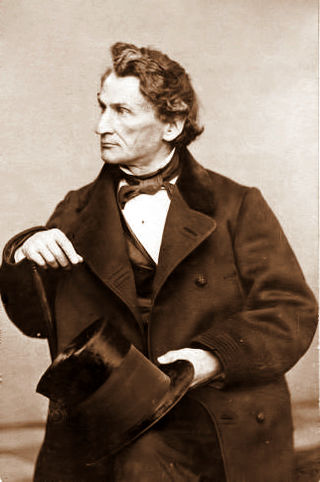
James Dwight DanaFRS FRSE was an American geologist, mineralogist, volcanologist, and zoologist. He made pioneering studies of mountain-building, volcanic activity, and the origin and structure of continents and oceans around the world.

Smoky quartz is a brownish grey, translucent variety of quartz that ranges in clarity from almost complete transparency to an almost-opaque brownish-gray or black crystals. The color of smoky quartz is produced when natural radiation, emitted from the surrounding rock, activates color centers around aluminum impurities within the crystalline quartz.

Prof Ferdinand Zirkel FRS(For) HFRSE was a German geologist and petrographer.

Colemanite (Ca2B6O11·5H2O) or (CaB3O4(OH)3·H2O) is a borate mineral found in evaporite deposits of alkaline lacustrine environments. Colemanite is a secondary mineral that forms by alteration of borax and ulexite.

Alunite is a hydroxylated aluminium potassium sulfate mineral, formula KAl3(SO4)2(OH)6. It was first observed in the 15th century at Tolfa, near Rome, where it was mined for the manufacture of alum. First called aluminilite by J.C. Delamétherie in 1797, this name was contracted by François Beudant three decades later to alunite.

A primary alcohol is an alcohol in which the hydroxy group is bonded to a primary carbon atom. It can also be defined as a molecule containing a “–CH2OH” group. In contrast, a secondary alcohol has a formula “–CHROH” and a tertiary alcohol has a formula “–CR2OH”, where “R” indicates a carbon-containing group.
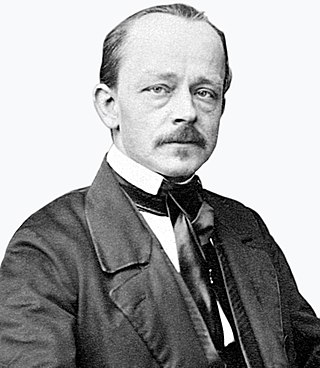
Gustav Adolph Kenngott was a German mineralogist.

Danburite is a calcium boron silicate mineral with a chemical formula of CaB2(SiO4)2.

Grossular is a calcium-aluminium species of the garnet group of minerals. It has the chemical formula of Ca3Al2(SiO4)3 but the calcium may, in part, be replaced by ferrous iron and the aluminium by ferric iron. The name grossular is derived from the botanical name for the gooseberry, grossularia, in reference to the green garnet of this composition that is found in Siberia. Other shades include cinnamon brown (cinnamon stone variety), red, and yellow. Grossular is a gemstone.

August Emanuel Rudolph von Reuss was an Austrian geologist and palaeontologist.
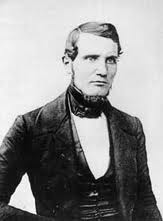
Joseph Marie Élisabeth Durocher was a French geologist.
Dopplerite is a naturally occurring organic substance found in amorphous, elastic or jelly-like masses, of brownish-black color, in peat beds in Styria and in Switzerland. It is tasteless, insoluble in alcohol and ether, and is described by James Dwight Dana as an acid substance, or mixture of different acids, related to humic acid. It is named after the physicist and mathematician Christian Doppler.
Bathvillite is a naturally occurring organic substance. It is an amorphous, opaque, and very friable material of fawn-brown color, filling cavities in the torbanite or Boghead coal of Bathville, Lothian, Scotland. It has a specific gravity of 1.01, and is insoluble in benzene. It may resemble wood in its final stage of decay.

Furazan, or 1,2,5-oxadiazole, is a heterocyclic aromatic organic compound consisting of a five-atom ring containing 1 oxygen and 2 nitrogen atoms. The furazan ring system is also found in the steroid furazabol. Furazan and its derivatives are obtained from the oxime derivatives of 1,2-diketones.
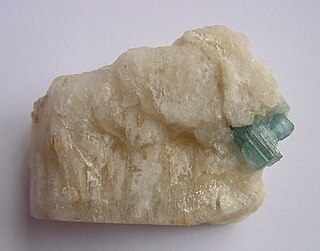
Beryllonite is a rare phosphate mineral with formula NaBePO4. The tabular to prismatic monoclinic crystals vary from colorless to white or pale yellowish, and are transparent with a vitreous luster. Twinning is common and occurs in several forms. It exhibits perfect cleavage in one direction. The hardness is 5.5 to 6 and the specific gravity is 2.8. Refractive indices are nα = 1.552, nβ = 1.558 and nγ = 1.561. A few crystals have been cut and faceted, but, as the refractive index is no higher than that of quartz, they do not make very brilliant gemstones.
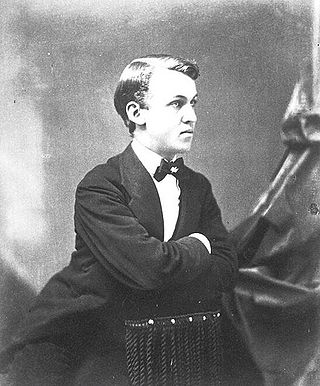
Edward Salisbury Dana was an American mineralogist and physicist. He made important contributions to the study of minerals, especially in the field of crystallography.

















